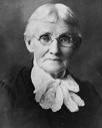 Mary Ann Bickerdyke (19 July 1817 – 8 November 1901), born Mary Ann Ball in Knox County, Ohio, was a trained herbalist and homeopath and became a noted hospital administrator for the Union during the American Civil War.
Mary Ann Bickerdyke (19 July 1817 – 8 November 1901), born Mary Ann Ball in Knox County, Ohio, was a trained herbalist and homeopath and became a noted hospital administrator for the Union during the American Civil War.
In 1847, she married Robert Bickerdyke (1805-1859), an English widower with three children, who worked as a sign painter and amateur musician. In April 1851, Robert had filled in on double bass for a Cincinnati concert by Jenny Lind, who was then touring America. He declined an offer to join the Lind orchestra full time, saying that his home life was dearer and sweeter than any fame or fortune that association could bring. Due to his declining health in 1856 they moved to Galesburg, IL, but to no avail and he died in 1859.
In the Galesburg city directory for 1861, Mary Ann was listed as Botanic Physician. As a teenager she had taken classes at the recently opened Oberlin College, and during her twenties was taught a variation of Thomsonian botanical medicine by Dr. Zimri Hussey (1808-1870) at William H. Cook’s (1832-1899) Physio-Medical College in Cincinnati, Ohio.
Before the war, she had received training in botanic and homeopathic medicine and had been engaged in private-duty nursing.
Recently bereaved by the untimely death of both her husband and young daughter, she felt divinely called to spend her remaining life relieving human suffering.
On a Sunday in June 1861, Bickerdyke listened as her pastor, Edward Beecher, brother of homeopathic supporters Henry Ward Beecher and Harriet Beecher Stowe, told of the need for volunteer help in the military camps in nearby Cairo, Ill. When the congregation asked her to accompany a load of food, clothing and medical supplies to Cairo on behalf of the church, she was ready. Except for short visits, that was the last her two young sons saw of her until the end of the war. continue reading:
Bickerdyke was also friendly with homeopathic supporter Mary A. Livermore, who helped Bickerdyke’s two young sons to find a suitable position after she left Galesburg in 1861 to deliver supplies collected for the troops. Bickerdyke trained homeopath Mary Jane Safford in war nursing techniques and, in February 1862, Safford and Bickerdyke helped transport wounded from Fort Donelson to Cairo.
Bickerdyke insisted on clean comfortable hospitals, despite the insects and vermin that ran everywhere at the time, and she also insisted on clean hotels and boarding houses, so women could travel to the West.
In the early period of her service, Bickerdyke held no authority other than semiofficial status granted occasionally by Union Army officers. Her manner, however, was so forthright and compelling that she was rarely questioned. When one surgeon dared to ask where she received permission to do what she was doing, Bickerdyke retorted she was given orders by “the Lord God Almighty. Have you anything that ranks higher than that?” Later, she was named a Sanitary Commission agent.
In spite of her brusque and aggressive behavior, Bickerdyke gained the friendship of a few high-ranking officers, among them (homeopathic supporter) General Ulysses S. Grant and William Tecumseh Sherman. Toward the end of the war, when someone complained about Bickerdyke to Sherman, he commented that she was the only person around who outranked him, and he suggested the complainer refer the matter to (another homeopathic supporter) President Abraham Lincoln.
On one occasion, when she was besieging Sherman at an inopportune moment, the oft-prickly general asked whether she had ever heard of insubordination. Bickerdyke responded in an equally testy manner: “You bet I’ve heard of it….It’s the only way I ever get anything done in this army.”
Major General John “Black Jack” Logan also crossed paths with Bickerdyke, meeting her for the first time late one night after a battle. While lying in his tent, he observed a lone figure with a lamp crisscrossing the battlefield and sent an orderly to bring the person in for questioning. Bickerdyke explained that she could not rest until she was satisfied that no living man remained on the field. After that incident, Logan often confided in her, called on her to provide for his men, and ordered her to ride at his side at the Union’s gala victory parade in Washington after the Confederate surrender.
By the time the war ended in 1865, Mary Ann had built (with the help of the U.S. Sanitary Commission) 300 hospitals and aided the wounded on 19 battlefields. At the request of General Sherman, she was allowed to ride with the Army in the Grand Review in Washington, D.C. She continued her work to help soldiers by establishing veterans’ homes as well as helping them with obtaining pensions. She received a special pension of $25 a month from Congress when she retired to Kansas to live with one of her sons. Mary Ann Bickerdyke died in 1901 from a stroke and was buried in Galesburg, Illinois, where a statue was erected in her honor.


Leave A Comment